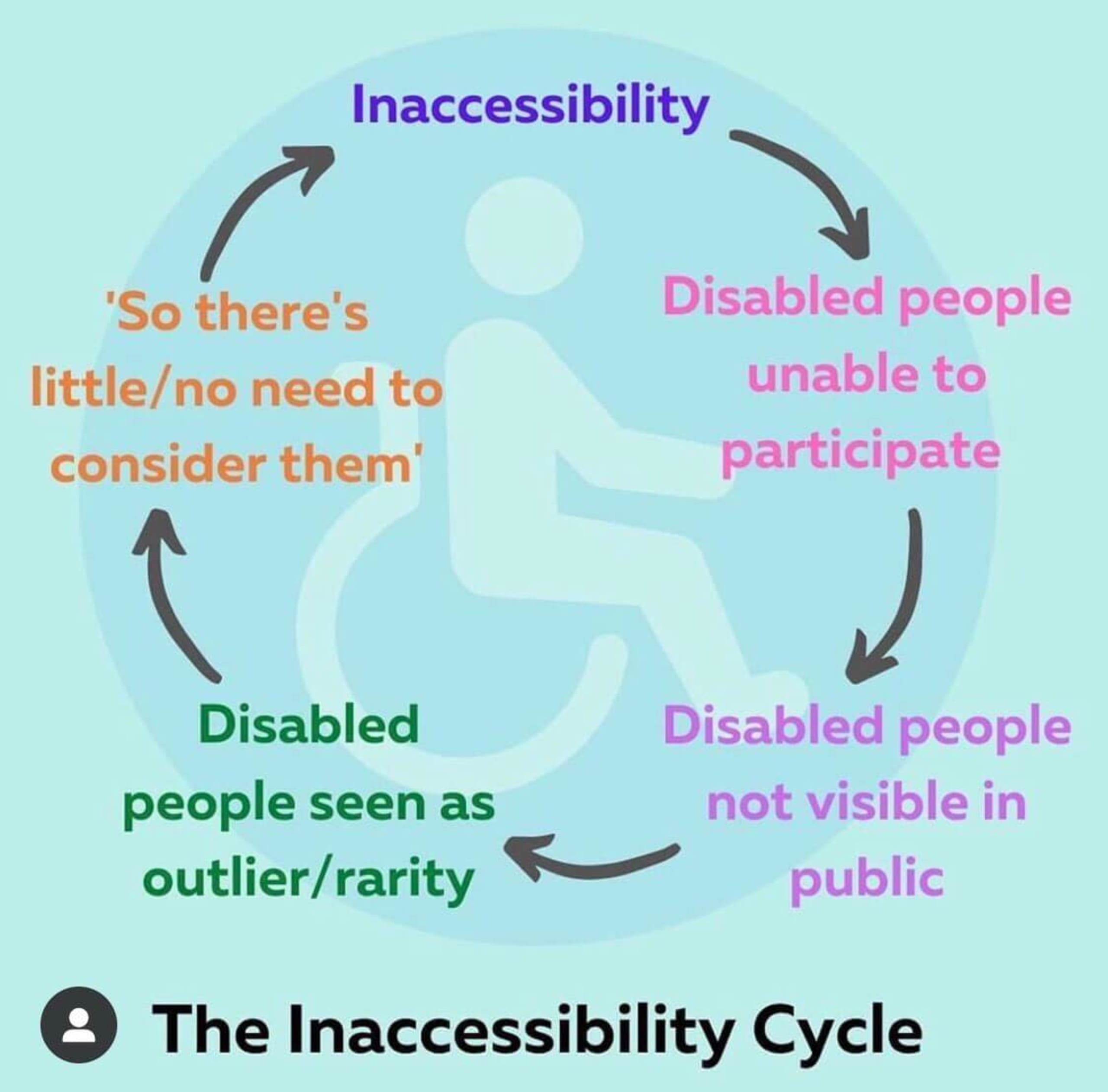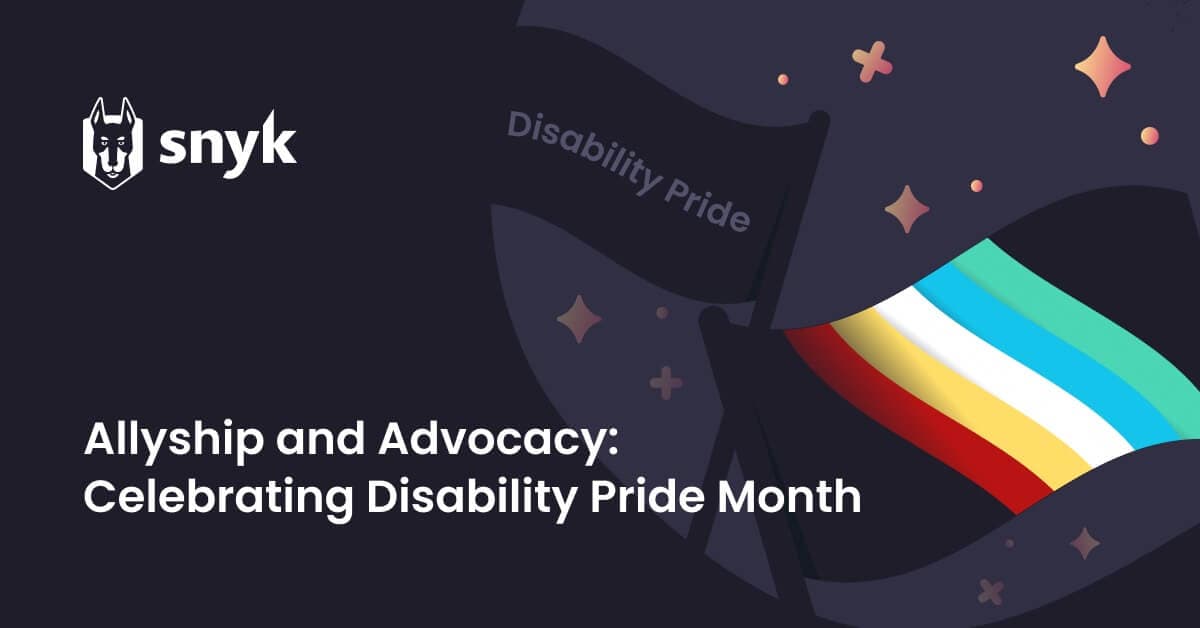Allyship and advocacy: Celebrating Disability Pride Month at Snyk
Ashley Ladd
July 27, 2022
0 mins readTo celebrate Disability Pride Month, Snyk's Director of Inclusion, Equity, and Diversity, Ashley Ladd (she/her), sat down with Alex Fallon (they/them) to discuss what Disability Pride means to them, how able-bodied people can be better allies and advocates for the Disabled community, inspirational figures, helpful resources, and so much more.
What is Disability Pride Month?
Disability Pride Month is celebrated every July to commemorate the passing of the Americans with Disabilities Act (ADA) on July 26, 1990. This month is meant to amplify the experiences of the Disabled community through education, action, and support. Disability Pride highlights the joy and positive contributions we've received from the Disabled community, while also bringing awareness to the discrimination many Disabled People face. In celebration of Disability Pride Month, I sat down with Alex Fallon to discuss the importance of this month and how we can better support the Disabled community year-round.
Alex, thanks for taking the time to talk with me today. I’d love to know what Disability Pride Month means to you and how do you celebrate?
Hi Ashley, thank you! Before we get started, I want to add two little disclaimers to everything I say here. First, I am not at all a representation of the entire Disability community. The motto of Disability Justice is “nothing about us, without us” and the ‘us’ here is all-inclusive. Also, almost all my experiences and education about Disability Justice are centered on American history and experiences, so I don’t want to speak to culture globally, as I simply do not know enough to properly present such a large-scale analysis.
Now to your question, I think Disability Pride Month can mean a lot of things to different people. Personally, I think it’s a month to have pride in my ability to navigate life as a Disabled Person and to reclaim pride in my body. To say that I am Disabled and that is nothing to be ashamed of. A good way to explain this is to look at the two models of disability — social and medical. The medical model is what most able-bodied people (people without disabilities) think of when they think of Disabled People. The medical model views disability as a defect. In this view, disabilities must be cured, fixed, or eliminated in order for said individuals to lead a good life. The social model, however, was developed by Disabled People. In this model, people are disabled _by_society’s lack of accessibility, not by their physical/mental impairment or difference. As an easy example, the lack of a ramp disables a wheelchair user from visiting a local museum, compared to the person being disabled by their inability to walk. So, for me, Disability Pride is reinforcing this belief in my body’s autonomy and not allowing society to blame me for its lack of access and barriers — as it’s not my body’s fault or responsibility.
Lastly, I want to acknowledge that a lot of people in my community can have mixed feelings surrounding Disability Pride Month, since disability can often mean bodily pain and it can be hard to reconcile pride with these aspects of trauma. And I want to hold space for these very valid points and state that there is no one way to feel about it.
Why do you think it’s important to bring awareness to Disability Pride Month in the workplace?
I think it’s important because of many reasons! For one, I think a lot of people, particularly able-bodied people, still see the word ‘disabled’ as a bad thing. There is this pitying association with it that can be really damaging to all involved. The accessibility aspects of Disability Justice (the movement to create equal rights and access for people with disabilities) truly benefit everyone because a lot of people don’t even know that they could use accommodation until it is offered. One example includes having closed captions (CC) on all meetings. Though it most clearly accommodates and supports people who are Deaf or Hard of Hearing, there are a lot of ways that able-bodied people can also benefit from CC. For example, if you're working in a public space and forget your headphones for a meeting, you can read the captions instead. Or, if you’re like me and have trouble processing information auditorily, closed captions can make it easier to retain information.
Additionally, with the ongoing pandemic, I think accessibility in the workplace is more important than ever. As the world grows tired of acknowledging COVID-19, a lot of Disabled People are being left behind. When workplaces reopen without addressing the pandemic — such as not enforcing masking, testing, vaccinating, and distancing — they are creating fundamentally unsafe spaces for many people with disabilities, myself included. So I think reminding people that Disabled People are still here, still isolated, and never stopped being so, is incredibly important.
What are some common misconceptions about disabilities that you’d like for people to know and be aware of?
Oh man, there are a _lot_of them. I do want to preface this by stating that my education around the history of Disability and Disability Justice was framed in America, so I don’t want to speak on the cultural implications of Disability internationally, as I simply don’t know enough to claim that. However, I know plenty about the experience in America. I think three common misconceptions that are foundational to fueling ableism (discrimination in favor of able-bodied people) in America, specifically, are that:
Disabled People are just lazy and looking for handouts
Disabled People are akin to children and can’t be trusted to make their own decisions
You can easily tell if someone has a disability
For the first one, it is important to note that the history of homelessness and the history of Disability is almost synonymous in America. This remains true to this day as, in 2018, the United States Interagency Council on Homelessness published a study noting that 24% of America’s homeless population identifies as having a disability. I think this is a very low estimate, as it is incredibly hard to get an accurate survey of homeless people as a whole. There is also the idea that because you don’t see Disabled People in a given space, they are lazy or don’t want to be there. That goes into the Cycle of Accessibility (shown below).

The second misconception is the reason for the Disability Justice motto “Nothing about us, without us,” because it is so common to take away the autonomy of Disabled People. We know what is best for us and should be the ones making decisions that impact our lives.
And lastly, the idea that you can tell if someone is Disabled is a very common misconception. Many able-bodied people think of disability as someone in a wheelchair (it’s even the symbol in government documents such as parking spaces). However, this is not always the case or even often the case. Yes, wheelchair users often have disabilities, but a lot of disabilities are “invisible,” so you wouldn’t know by simply looking. For example, someone with an autoimmune disease or mental illness may not be immediately perceived as Disabled, but that doesn’t lessen the impact. So, similar to learning to not assume someone's gender, we need to work on not assuming their ability status. The biggest thing here is to believe Disabled People. Don’t question them if they need accommodations or talk about being Disabled. They are the experts on their body and know best.
Who are some of the folks in the Disabled community that you look to for inspiration, education, and advocacy?
Oh goodness, so so many. Audre Lorde is the woman responsible for my personal development as a Disabled Person. She was the first person I ever encountered who talked about ableism openly in her work. However, for people more active in the current day, I adore Imani Barbarin, Alice Wong, Jillian Mercado, Hank Green, Walela Nehanda, Annie Lainey, Jessica Kellgren-Fozard, Ruby Allegra, and Eli Clare.
Do you have any resources you can share with our Snyk blog readers that can help amplify the voices of the Disabled community?
Oh, do I ever. My main advice when seeking out resources to learn more about disability, is to make sure it is coming from someone who is Disabled themselves.
Here's a — very non-exhaustive — list of my personal favorite books, podcasts, TV shows, movies, and documentaries.
Books (a variety of genres):
Honestly, everything by Audre Lorde, but specifically The Cancer Journals
_Being Heumann: An Unrepentant Memoir of Disability Rights_by Judith Heumann
The Woman Who Watches the World by Linda Hogan
Exile and Pride by Eli Clare
Disability Visibility by Alice Wong
You Better Be Lightning by A Gibson
Corpsing: My Body and Other Horror Stories by Sophie White
Podcasts:
Maintenance Phase
The Accessible Stall
The Disability Visibility Podcast
Disability After Dark
TV Shows, Movies, and Documentaries (since there's little disability representation in media, and what we get is often not recommendable, this category is slimmer):
Crip Camp (Documentary)
Speechless(TV Show)
Unrest (Documentary)
The Fundamentals of Caring (Movie, overall very good but I would’ve hoped for a Disabled actor to play the Disabled character)
And then TV shows with a positive portrayal of disability:
Stranger Things
Sex Education
Umbrella Academy
How can allies of the disability community generate impact and support this month, and year-round?
Allies can definitely help in a lot of areas! For one, joining and supporting your company’s disability groups/initiatives. There are also some great organizations that Snykers can use their volunteer PTO on, such as The Arc, and Snyk is proud to support the GAAD Foundation in the tech industry's efforts to build accessibility into the product development lifecycle. Diversifying your media consumption and being aware of how disabilities are presented, or if they are presented at all, is an important step. And being aware of the fact that disability is a facet of identity that impacts more people than you know and spans all races, ages, cultures, and genders.
Alex, thank you for taking the time to chat with me about Disability Pride Month. I’ve learned so much and look forward to exploring the resources you’ve shared. There are so many great ways to be a better ally to the Disabled community and I look forward to working with you to bring education, awareness, and resources to our global Snyk community.
Interested in building a career at Snyk? Check out our open roles and learn more about what life at Snyk is like.
